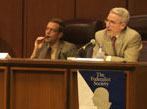UI hosts Roberts panel discussion

Troy Stanger
Sep 14, 2005
Last updated on May 11, 2016 at 10:04 p.m.
As the senate hearings for the nomination of John Roberts as Chief Justice of the Supreme Court continued yesterday afternoon, students, faculty and community members gathered at the University’s College of Law for a panel discussion on the nomination process.
Sponsored by the University chapters of the American Constitution Society for Law and Policy along with the Federalist Society, the panel discussed the importance of the Supreme Court, the nomination of John Roberts and the future status of the U.S. Supreme Court. The two national organizations represent the liberal and conservative views, respectively.
“The Supreme Court has an effect on privacy laws, abortion, affirmative action – you name it, they play a role,” said Timothy Bell, president of the Federalist Society. “With two appointments, President Bush has the opportunity to put a fingerprint on what the court will say in the future.”
The five panelists started the afternoon discussion with a variety of statements and opinions about Roberts and the nomination process.
Get The Daily Illini in your inbox!
“I like to think of the Supreme Court as a legal all-star team,” said Andrew Leipold, University professor of law and a panelist.
The panelists all discussed that while the confirmation process and nomination of Roberts is an interesting topic, the other issue concerns the filling of Justice Sandra Day O’Connor’s seat, whose retirement from the court is predicted to have a greater effect on the balance of liberal and conservatives on the court.
“One of the really interesting things about the current hearings – the ones that are going on now – is how much they really are about the next hearings,” Leipold said.
The Senate, in the current hearings, seems to be talking to the White House and letting them know what they will and will not accept and what they are judging the nominees on, Leipold said.
University professor Lawrence Solum also shared his opinion of the topic. The appointment of Roberts as Chief Justice maintains the status quo and balance of the court, he said. Roberts’ past decisions in lower courts reflect similar tendencies to the late Chief Justice William H. Rehnquist, whom he will replace.
“Roberts will be confirmed, and I think he will be confirmed overwhelmingly,” Solum said.
Opposition to the appointment of Roberts is “cheap talk” and would merely be the senators’ attempting to appease their constituents in a situation where they know their vote will have a diminished impact, Solum said.
The panel also focused on the confirmation process.
The confirmation process in its current state is more about political theater than anything else, said James Pfander, University professor of law. It is a play between the White House, Senate and political parties.
“By everybody’s account … the (confirmation) process has become an awful lot more political and an awful lot more partisan, and I think almost everyone regrets that,” said David Meyer, University professor of law and a panelist.
The panel discussion concluded by opening the floor up to questions.
“The average person knows almost nothing about appointments to the Supreme Court,” Solum said. “But if you care about politics, you really should care about the Supreme Court.”





